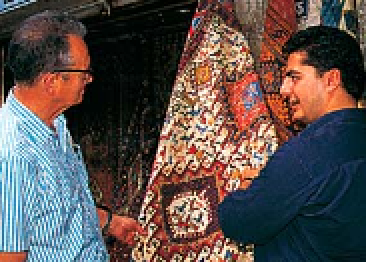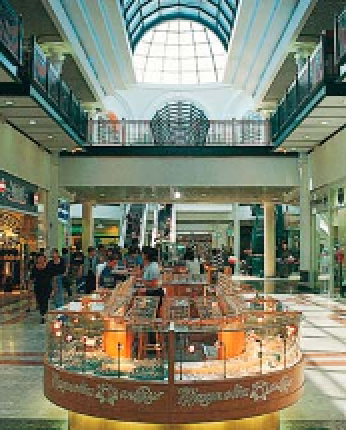Travel Reference
In-Depth Information
Europe and the
United States.
Jerusalem has
several large malls,
inlcuding one of
the biggest in the
country, the
Malkha
Kanyon Mall
, out in
the Malkha suburb
of West Jerusalem.
In the centre of the
city,
City Tower
is
a multi-storey
shopping centre at
the coner of Jaffa
Road and King
Geor
g
e V Street.
Tel Aviv's newest
A
and biggest mall is
the
Azrieli Centre
,
in the base of three
modern towers on
the northeastern edge of town.
More
centrally located malls in
Tel Aviv include the
Mecca Mall
, out in the north-
western suburbs, which also
contains a food court, cinema
and bowling alley. There's
also the smaller but more
centrally located
Abdoun Mall
.
MARKETS
In addition to the souks of
Jerusalem's Old City, there
are lots of good buys at the
Makhane Yehuda
market in
modern Wes
t
Jerusalem
(see
p131)
. Tel Aviv has
A
Carmel
Market
(see p172)
, which
operates every day except
Saturday, and, also in the same
neighbourhood, the Nakhalat
Binyamin
craft mar
k
et
(see
p172)
, held every Tuesday and
T
Friday. In Jordan, Downtown
Amman has several streets
filled with colourful market
shopping
(see p212)
Malkha Kanyon Mall in Malkha, Jerusalem
departure. You must have the
purchases with you to cross-
check against the invoice.
Queues at this counter can be
very long, so get there with
time to spare.
A
Dizengoff
Centre
on Dizengoff Street and
the
Gan ha-Ir Shopping Centre
just north of Rabin Square.
As well as the shopping
opportunities, Israel's malls
are typically full of good,
moderately-priced restaurants,
snack bars and cafés. Given
that they are air-conditioned,
they can be great places for
pedestrians to escape from
the often stifling heat outside.
Jordan's capital, Amman, has
also succumbed to the mall
craze. The city's biggest is
BUYING ANTIQUES
In Jordan and Sinai it is
forbidden to export any
antique or archaeological
find. The border authorities
are extremely thorough in
their checks in this regard. On
the other hand, in Jerusalem
and Israel you may buy
objects from excavations.
For more details and for the
addresses of some reputable
dealers, see pages 148-9.
DEPARTMENT STORES
AND SHOPPING MALLS
Israel has a rapidly growing
number of large shopping
centres and US-style out-of-
town malls. Both are filled with
standard mall-type outlets that
sell everything from greetings
cards to electronics items, most
of which are imported from
HOW TO BARGAIN
Buying and selling in the Middle East is
traditionally a highly ritualized affair, in
which bargaining is far more than just
haggling for a cheap price. The aim of the
exercise is to establish a fair price that both
vendor and buyer are happy with. As part
of the process, a shopowner may well invite
you to have a cup of tea or coffee and may
literally turn the place upside down to show
you something; you should not feel obliged
to buy because of this, it is common sales
practice and all part of the ritual.
Bargaining, by the way, is not socially
acceptable in city-centre shops, but it is
unavoidable in the souks if you don't wish
to pay greatly over the odds.
The way to go about it is that once you
identify an article that interests you, especially
an expensive one, be brave enough to offer
half the price quoted by the shopowner.
Don't be put off by any feigned indignation
on the part of the shopkeeper and only
raise your next offer by a small amount.
Through offer and counter-offer you should
Haggling over the price - time-consuming but
essential to avoid paying over the odds
arrive at a mutually agreeable price. If you
don't reach a price you think is fair then
simply say thank you and leave. Making to
walk away often has the effect of bringing
the price plummeting down.
In theory, no one gets cheated because
you, the buyer, have set the price yourself;
it follows that you are happy with what you
have agreed to pay, and the shopkeeper will
certainly never sell at a loss.















